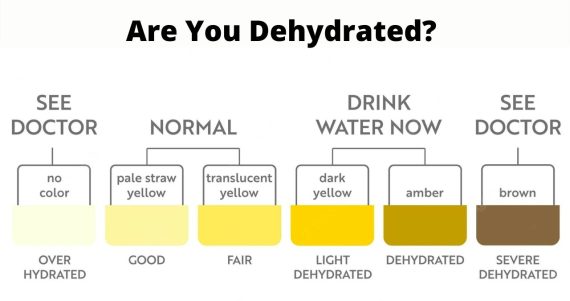How healthy are you? It can be detected by the color of urine
Red, yellow, pink and green. Sometimes the color of urine can be like a rainbow. It can also be purple, orange or blue in color. Many such changes in the color of urine cannot be considered a normal condition.
Our body removes waste through urine. It also flushes out the nitrogenous wastes that are formed by mixing proteins, muscles and red blood cells in the body.
In addition, many other substances such as vitamins and medicines that we eat are excreted from the body through urine.
There are some elements which should not be present in urine. So, when you have a health problem, the question that the doctor often asks is, 'What is the color of your urine?'
From the answer to this question, what is the health condition of the doctor and what kind of treatment can be given? It is easy to guess roughly.
red color
If the color of the urine is red, it indicates that there is blood in it. It can cause problems in any part of the body related to the urinary system. If there is blood in the kidney, bladder, prostate or any tube connected to the ureter, the urine may be red.
Similarly, how blood is excreted through urine depends on many physical conditions. For example, what is the amount of blood in the urine? Looking at how fresh? And, are there other problems while urinating?
If there is a lot of bleeding, the color of the urine looks like 'red wine'.
Such bleeding can be due to many reasons. For example, kidney stones, cancer, trauma, any infection in the urinary tract. Even if you eat beetroot more than necessary, the color of urine can be red.
Under normal conditions, our urine looks like yellow color and orange color. It also depends on how much water we drink.
As water becomes less, the color of urine becomes dark yellow and sometimes orange in color.
If you drink enough fluids, the color of urine will be thin and pale yellow. The substance that makes urine yellow is called 'urobilin'.
Its production process begins with the breakdown of old red blood cells in the body. Those blood cells that are not in good shape need to be removed from the body system.
In this process, a compound called bilirubin is formed. It exits the body to some extent through the urinary tract and to some extent through the intestines. Bilirubin is used in our liver to produce bile that is released when we eat. This pitta is important for digestion and helps break down fat in the body.
Bile stays in the intestines and passes out through the stool. Due to this pitta, the stool looks brown in color. Bile can also be unable to reach the intestine, which indicates gallstones or cancer blocking the bile ducts. In this case, bilirubin returns to the bloodstream. And it comes out through urine.
Therefore, the color starts to darken, appearing orange or brown. If the amount of bilirubin increases, the color of the skin also starts to turn yellow. This condition of the body is called 'obstructive jaundice' i.e. a type of jaundice.
In this case, if the amount of bilirubin increases, the color of the face becomes yellow. Some medications, including the antibiotic rifampicin, can cause orange urine.
Green and blue
Green and blue colors are rarely seen. If the color of the urine is green or blue while urinating in the toilet, the person may be surprised.
If green or blue dyes are used to color any food, the color of urine may be green or blue. Eating such foods in excess can cause such urine.
Taking some medicines like anesthetics, vitamins, antihistamines can also cause the color of urine to be green or blue. Some bacteria also make compounds, which are green in color.
Pseudomonas aeruginosa bacteria produce blue and green colored pyocyanin.
Urinary tract infection can be seen in rare cases. In such a situation, urinating may cause burning and pain.
female stomachache because poisonous food
purple
This situation is also rare. One possible cause of this is porphyria. It is a genetic disease that affects the skin and nervous system.
The second reason for this is a rare disease called Purple Urine Bag Syndrome. Which is due to urinary tract infection.
In this case, using a catheter (a device used medically to remove urine from the body) also makes the urine purple.
pink
A small amount of beetroot can cause the color of urine to be pink instead of dark red. In such cases, urologists compare it to red wine.
There may be other colors of urine, which are not part of the rainbow. Some are dark in color. Usually brown or black. When this happens, doctors may compare it to Coca-Cola.
other diseases
The color of the urine can be brown or black, which the doctor can compare to Coca-Cola. Sometimes this color appears when muscles are broken down and converted into a compound called myoglobin. Which is a sign of a serious disease called rhabdomyolysis. Therefore, excessive exertion or the use of some medicines may be necessary.
Similarly, bilirubin can also cause black and gray color. Bilirubin makes the urine so dark that it appears both black and brown in color.
Kidney swelling
This color can also be seen in acne (glomerulonephritis). Due to this, when passing through the urinary tract, the urine changes from red to brown in color and sometimes the urine can be colorless.
Urine should not be dark yellow in color. Likewise, a large amount of thin urine can also indicate some diseases. Whether it is due to diabetes or excessive alcohol consumption.
It shows how many different colors our urine can be and how many different problems it can indicate. And, this is by no means a list of every problem.
But understanding the reason for the change in urine color will help you decide whether to drink water or see a doctor.
Is frequent urination at night a sign of diabetes?
A night's sleep acts as a medicine for the tiredness of the day. If something disturbs the sleep, there will be many problems. Frequent urination at night is one of the reasons that disrupts sleep.
If you have to go through this problem every day, it is not normal. This problem is related to diet and lifestyle, Dr. Veer Hospital's chief consultant Eurosurgeon. Ravin Bahadur Basnet says.
"Frequent urination at night can also indicate diabetes, urinary tract infection or prostate disease," he says.
Drinking a lot of water makes you urinate frequently?
Many people think that because they drink a lot of water before going to bed, it is normal to urinate a lot at night. But it doesn't always happen. This can be a symptom of diabetes and other serious problems. Vinay Bhattarai says.
If you drink a lot of water before going to bed, sometimes you may urinate frequently at night. But if there is a problem of frequent urination at night, drinking water before going to sleep or drinking too much water may not be the reason, he says.
Dr. Bhattarai continues, “Diabetes increases blood sugar levels, which puts a lot of pressure on the kidneys and they cannot absorb the extra sugar completely. As a result, excess sugar is excreted through urine, but at this time, a large amount of water is also absorbed from the body. As a result, more urine starts coming out. In such a situation, when you feel very thirsty, the amount of water increases and you urinate frequently.
In diabetes, there is frequent urination not only at night but also during the day. If there is a problem of dry mouth and frequent urination, Bhattarai suggests getting diabetes checked.
Other causes of frequent urination
Dr. If you do not urinate frequently during the day, but you have to urinate frequently at night, it may also be due to heart problems. Basnet says. "If the heart is not working properly during the day, water accumulates in the lower part of the leg while standing and sitting," he says. Makes and may urinate frequently at night.'
Frequent urination in men can be a symptom of prostate problems. As the age increases, the prostate gland increases and frequent urination occurs not only at night but also during the day.
"Urinary tract infection (UTI) due to the infection of the urinary tract, the problem of frequent urination at night also appears," said Dr. Bhattarai says, "Even if there is an infection in the kidneys, urine can come many times during the night."
He says that a woman's frequent urination at night is also a common early sign of pregnancy. He says that this problem appears when the growing fetus puts pressure on the bladder.
If you urinate frequently at night, you should first have a urine test to identify whether there is any health problem. If there is no identification from that, other tests such as ultrasound should be done," said Dr. Bhattarai says, "We find out whether there is any problem in the test. If a problem appears, it should be treated on the advice of a doctor.







